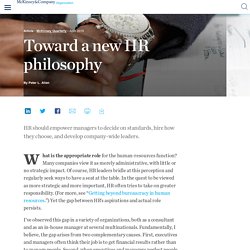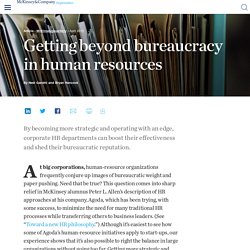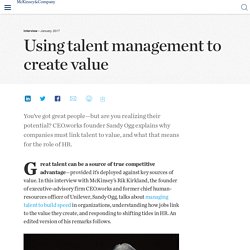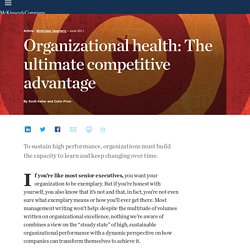

Is-changing-the-nature-of-work. The generation that is quickly occupying the majority of business leadership roles is one that’s grown up playing video games, spends the most time shopping online, and uses social media more habitually than any other generation. If you were thinking it’s millennials, that’s probably because they’ve dominated the media’s focus for the past decade. But it’s actually Generation X, which covers those born between 1965 and 1981 by our definition. As Pew Research unflatteringly referred to them in a 2014 report, Gen X is “America’s neglected ‘middle child,’” and we don’t hear much about the group.
It seems that all eyes are on the slowly retiring baby boomers or the ascending millennials, now the world’s majority generation. But our recent study revealed that Gen X is playing a critical — and underappreciated — role in leadership as organizations grapple with digital transformation. Suzy Welch: This simple question from Jeff Bezos changed the way I think about work. 2017 HRD Pulse Survey. Toward a new HR philosophy. HR should empower managers to decide on standards, hire how they choose, and develop company-wide leaders.

What is the appropriate role for the human-resources function? Many companies view it as merely administrative, with little or no strategic impact. Of course, HR leaders bridle at this perception and regularly seek ways to have a seat at the table. In the quest to be viewed as more strategic and more important, HR often tries to take on greater responsibility. (For more, see “Getting beyond bureaucracy in human resources.”) I’ve observed this gap in a variety of organizations, both as a consultant and as an in-house manager at several multinationals. But this approach is based on erroneous thinking.
Helping managers manage I joined the online travel agency Agoda.com three years ago to lead the HR function. I believe that sharing our experience may prove useful for other organizations as well. Managers, not HR, should define, live, and develop the company’s leadership. Compensation. Getting beyond bureaucracy in human resources. By becoming more strategic and operating with an edge, corporate HR departments can boost their effectiveness and shed their bureaucratic reputation.

At big corporations, human-resource organizations frequently conjure up images of bureaucratic weight and paper pushing. Need that be true? This question comes into sharp relief in McKinsey alumnus Peter L. Allen’s description of HR approaches at his company, Agoda, which has been trying, with some success, to minimize the need for many traditional HR processes while transferring others to business leaders. (See “Toward a new HR philosophy.”) Getting more strategic One reason large organizations end up with a supersized human-resource infrastructure is that the business rationale for HR processes has been lost. In the latter case, the leader was a chief human resources officer (CHRO) with the insight to identify core business issues and the discipline to eliminate redundancies. Operating with an edge Talent pools and gaps Compliance. Using talent management to create value. You’ve got great people—but are you realizing their potential?

CEO.works founder Sandy Ogg explains why companies must link talent to value, and what that means for the role of HR. Great talent can be a source of true competitive advantage—provided it’s deployed against key sources of value. In this interview with McKinsey’s Rik Kirkland, the founder of executive-advisory firm CEO.works and former chief human-resources officer of Unilever, Sandy Ogg, talks about managing talent to build speed in organizations, understanding how jobs link to the value they create, and responding to shifting tides in HR. An edited version of his remarks follows. Video Interview transcript We used to think about what, people are our most important asset. And just the word “talent” means something different. Organizational health: The ultimate competitive advantage. To sustain high performance, organizations must build the capacity to learn and keep changing over time.

If you’re like most senior executives, you want your organization to be exemplary. But if you’re honest with yourself, you also know that it’s not and that, in fact, you’re not even sure what exemplary means or how you’ll ever get there. Most management writing won’t help: despite the multitude of volumes written on organizational excellence, nothing we’re aware of combines a view on the “steady state” of high, sustainable organizational performance with a dynamic perspective on how companies can transform themselves to achieve it. We’ve tried to fill that gap with our forthcoming book, Beyond Performance: How Great Organizations Build Ultimate Competitive Advantage (Wiley, June 2011), from which this article is adapted.
Nor should you study what other companies do and then apply their approach. Video Why health? Statistical evidence ‘Experimental’ evidence The results were striking. Act. HR in the Age of Disruption. Gx dup global human capital trends 2016. Gx dup global human capital trends 2016.